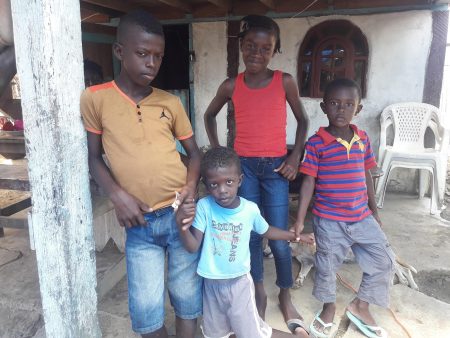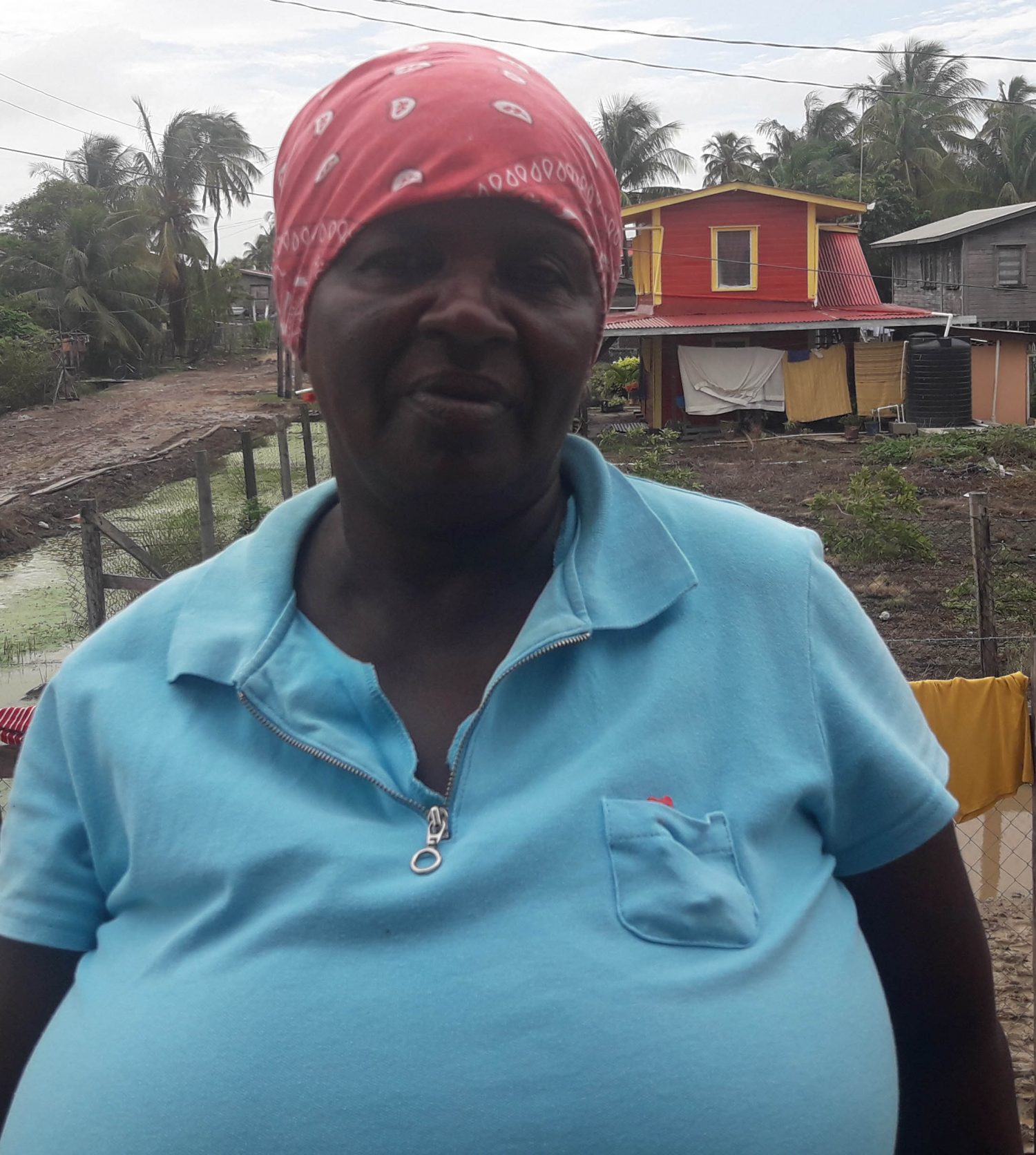By Oluatoyin Alleyne and
Bebi Oosman
Cervical cancer patient Arlene Tyndall, who succumbed just over a week ago, was diagnosed with late stage cervical cancer last August but because of her low blood count, treatment was not immediately administered.
This is according to Director of Outreach at the Cancer Institute of Guyana (CIG) Dr Syed Ghazi, who said the woman had visited the institute with the results of a biopsy and she was diagnosed with the cancer. She was expected to be given blood and have chemotherapy done at the Georgetown Public Hospital (GPH) and radiotherapy at the institute. It was expected that she would have had a blood transfusion at the hospital and then treatment would have commenced.
“She disappeared after the initial visit in August, she never came back,” Dr Ghazi told the Sunday Stabroek recently.

It is not clear what happened at GPH but the next time Tyndall, of Ulverston Village, Corentyne, was heard of was following media reports in December, 2017, when she was in dire staits and was seeking assistance. Persons rallied around her and her family and offered support but it was too late.
Her case exposes the glaring gap in the healthcare system as it is not clear if officials at the GPH had followed-up with her. The CIG is privately run and Ghazi said that the staff there were awaiting Tyndall’s return for radiotherapy after she would have been treated at the public hospital.
Sunday Stabroek was unable to speak to anyone at the Oncology Department of the GPH.
Tyndall’s case also puts the spotlight on the fact that although testing for the cancer is readily available, women are still being diagnosed in the late stages of the cancer.
Following the media reports, the 31-year-old mother of five, according to her mother, Lucille Mendoza, was once again taken to the GPH, where she spent three weeks and was given blood.
Around that same time, in January of this year, she was seen again by the CIG but her blood count was still too low for treatment to commence.
Her mother recounted to this newspaper that doctors had told the family that in order for the woman to start chemotherapy, she had to receive more blood. According to the woman, three weeks before Tyndall died, doctors had explained that she needed five more pints of blood. “Me try. Me buy blood. People pulling blood. We paying for the blood and carry it, beside the hospital give too when they get,” Mendoza explained.
According to Mendoza, due to the cancer, Tyndall’s body was passing out the blood, which was being given to her.
She also complained about the shabby treatment her daughter received at the hands of nurses at the hospital, which may have been responsible for her insisting that she wanted to leave the institution. In the end, she did just that and she died a few days later surrounded by her children and other relatives.
Mendoza stated that on two occasions during her daughter’s close to three-week stay, she complained that nurses did not pay much attention to her. “She say for three days she calling them nurses and them nah worry with she, them just coming and put the tablets down and leave it,” the mother said. “The nurse them difficult. When we go deh, then we calling the nurse, [because] she not smelling good, she need to bathe.”
She added that her daughter told her she fell off her bed twice and relatives of nearby patients had to assist her.
Mendoza also said that the doctors and nurses did not update the family on her daughter’s condition. “Them always talking by themselves,” the woman added.
‘Non-compliant’
Meanwhile, according to Ghazi there is an issue with what he described as “non-compliant” patients as he said there are cases where patients are afraid of being treated.
He made it clear, however, that he could not be certain if Tyndall was such a case and acknowledged that there are also other factors, such as the patient being in financial trouble or being mentally affected after receiving the diagnosis.
“What we do know is that she was seen by a doctor and then she disappeared. She was living far and so there are many reasons why she may not have returned. We don’t know,” the doctor said.
He pointed out, however, that had the patient followed through with the advice and had the required treatment, her outcome may have been different. He said there are established treatment protocols that are followed at oncology hospitals when treating such patients and this has to be followed accordingly as there is no magic fix.
“You cannot say disappear and it disappears, the treatment has to be administered,” he said.
He added that there are cases where patients are impatient and then they are sometimes distracted by people around them, who sometimes indicate that the treatment will kill them instead of help them.
He urged that patients not be distracted when diagnosed with cancer but focus on being treated. While he admitted that there might be “ups and downs” with the treatment he maintained that patients should stay with it and follow the required protocol.
‘We try we best’
Mendoza, who had lost her voice and was suffering from a migraine when Sunday Stabroek spoke with her, said the family tried its best with Tyndall, “but is what God want.” She added, “We try we best to see that she woulda be alive today, but the pain was so much on she.”
Mendoza said they visited the woman two days before her death and she insisted that she wanted to return home to be with her children and family. She explained that on Thursday before she passed, Tyndall took a transfer to the New Amsterdam Public Hospital. But instead of heading to the county hospital, Tyndall requested to be taken home. “She wanted to sleep home the night and be with the kids and she will go next day, but when morning reach now, she crying she don’t want to go,” she related.
She said Tyndall begged her relatives to “stay and sleep with them children two days more.” Her mother said, “Like she musse get signs that she musse guh go, I don’t know.”
On Saturday, hours before Tyndall passed, she had her last conversation with her sister, who stood behind her through it all.
The woman said around 10 am on Saturday, her daughter became extremely weak. “When she come from hospital, she couldn’t walk, she couldn’t hold spoon to eat or nothing and then she get more weak.”
She recalled, “I went go buy water in the other yard and them start shout how she eye shut.” She said she rushed upstairs and saw her daughter’s lifeless body. She noted that in that moment she thought to herself that her daughter’s pain was over, but that does not make her death hurt any less.
Tyndall’s family and her husband Kurleigh Hooper, 37, are now focusing on rallying for the five children and ensuring that they are taken care of.
Her 69-year-old mother told this newspaper that her daughter’s dream was to live to see her children grow into well-grounded individuals with proper education. She stressed that in order to fulfil her daughter’s dream, she and Tyndall’s sister will now play their roles and assist the Hooper with ensuring the children’s well-being.
The woman stressed that the family will do its best to maintain the children.
Hooper had told the Sunday Stabroek that his younger children do not really understand what is happening, however, they do know that their mother has passed. The man thanked all the relatives who supported his wife during her illness and he stressed that the family will continue to be united for the sake of the children.





